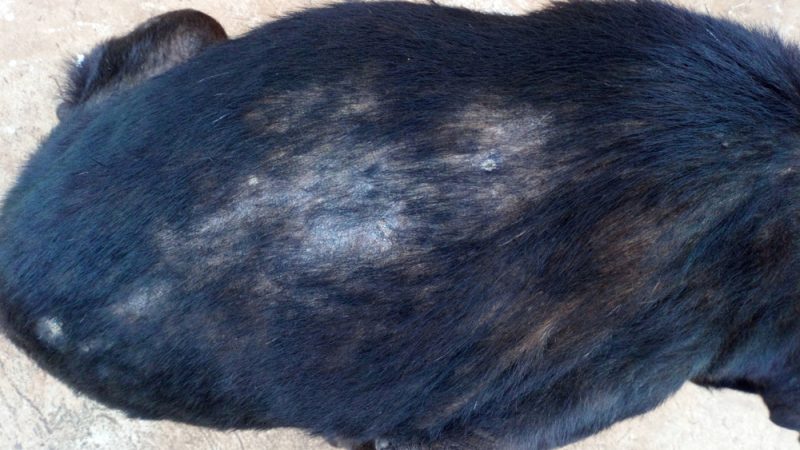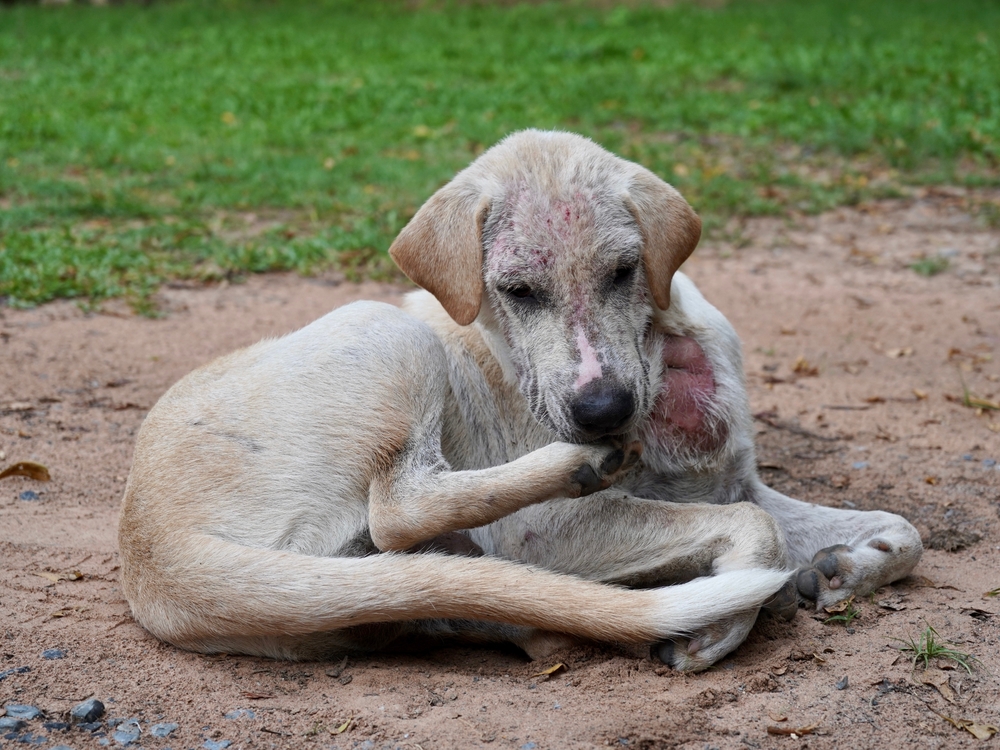Psoriasis impacts over 3% of adults in the United States, typically resulting in inflamed, red, and scaly skin patches. If you or someone you know deals with this skin condition, you might wonder if it can affect your dog too. So, can dogs get psoriasis?
Although dogs experience various skin problems with similar symptoms, psoriasis is not currently recognized as a disease in dogs. There is only one scientific report so far of a dog having a psoriasis-like skin condition.
Continue reading to learn more about what could be causing your dog’s itchy, inflamed, scaly skin.

What Is Psoriasis?
Psoriasis in humans is an immune-mediated condition where the body's immune system overreacts, acting as if harmful substances are attacking the body. Researchers are still studying what triggers this immune response, which involves both genetic factors and external elements like bacterial infections.
There are different types, but psoriasis generally causes dry, scaly skin patches that are usually red, inflamed, and often sore or itchy. Some people with psoriasis also develop psoriatic arthritis, leading to joint pain, swelling, and stiffness.
Can Dogs Get Psoriasis?
While online articles sometimes discuss canine psoriasis, it has not been identified or acknowledged as a disease affecting dogs.
When researching animal models for this complex condition, scientists have only found a few anecdotal reports of naturally occurring conditions with psoriasis features in other species, and just one formal report of a dog diagnosed with a "psoriasis-like" condition.
There is also a rare canine skin condition called psoriasiform lichenoid dermatitis, which shares some clinical and histological characteristics with human psoriasis, but it has only been found in Springer Spaniels.


What Canine Skin Conditions Look Similar to Psoriasis?
So, what is more likely causing your dog’s itchy, red, flaky skin? Dogs are prone to several conditions that look very similar to human psoriasis. Let’s examine some of the more common causes of these skin signs in dogs:
Allergies
Like humans, dogs can develop allergies to things such as pollen, house dust mites, and foods (usually animal-based proteins). In dogs, the most common sign of allergies is itchy skin, so affected dogs often have red, inflamed skin, hair loss, and skin infections. Canine atopic dermatitis, typically linked to sensitivity to environmental allergens, has a hereditary tendency and is a particularly common skin disorder in dogs, affecting about 20%–30% of the canine population.
It is recommended to consult a veterinarian if you have any questions or concerns about your pet’s health and well-being.
Parasites
Fleas are a frequent cause of itchy skin in dogs. Some dogs have flea allergic dermatitis and are allergic to components of flea saliva, making their reactions to flea bites much more severe than other dogs.
Dogs can also be affected by various mites. Some live on the skin surface, like cheyletiella mites, often known as "walking dandruff" because of the scaly flakes visible in the coat. Others burrow into the skin, such as sarcoptes mites (causing very itchy sarcoptic mange) and demodex mites. Both can lead to hair loss, thickened and often inflamed skin, and sometimes increased scaling.

Skin Infections
Bacterial skin infections (pyoderma) often cause crusts, dry or flaky skin patches, and itching that may resemble psoriasis. Yeast dermatitis caused by Malassezia pachydermatis is also a common cause of itching, thickened skin, crusts, and scales.
Although less common in dogs, ringworm (dermatophytosis) is a fungal skin infection that can also present with scaly patches of hair loss.
Seborrhoea
Seborrhoea is the term for ongoing scaly skin conditions caused by problems in the normal cycle of skin cell production and shedding. This process is affected by other medical issues, such as skin allergies and infections. However, some dogs have an inherited condition that affects how skin cells are made and replaced. This is more common in certain breeds, such as Cocker Spaniels, West Highland White Terriers, and Basset Hounds. Signs usually start earlier in life.


Can You Use Human Psoriasis Medications on Dogs?
Never give or apply medication prescribed for humans to your dog. In the case of some psoriasis creams, this could even be life-threatening.
Vitamin D analogs, such as calcipotriene, are commonly found in topical creams for treating psoriasis in humans. Brand names include Taclonex and Dovonex. Dogs have a low toxicity threshold if they ingest any of these products. They cause an increase in blood calcium levels, leading to gastrointestinal upset, increased thirst and urination, and in severe cases, kidney failure, seizures, and heart issues.
Contact your vet immediately if your dog has ingested any amount of psoriasis cream.

Final Thoughts
Psoriasis is a common, long-term skin condition that affects humans. It is a complex immune-mediated disease with a genetic basis. To date, psoriasis is not recognized as a disease in dogs, but dogs can suffer from several skin conditions that present with signs very similar to psoriasis, especially allergies.
If your dog is itching or has patches of red, flaky skin, take them to your vet for diagnosis and treatment. Never use any human medications that have not been prescribed for them.
